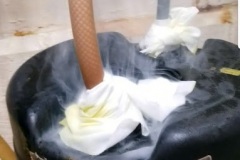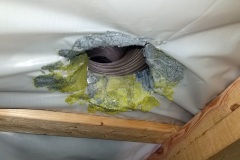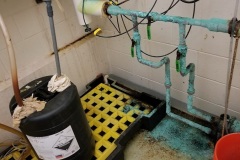By Alice Waugh
 The Water Department recently stopped allowing rate caps for agricultural users of town water, but after farmers were taken by surprise and objected, officials decided this week to study the matter further.
The Water Department recently stopped allowing rate caps for agricultural users of town water, but after farmers were taken by surprise and objected, officials decided this week to study the matter further.
The issue of water rates is a sore subject for the town. To help pay for an array of capital projects and new equipment, residents voted to approve bonding totaling about $2 million at Town Meetings in March and November 2019, and the department has been in a financial and staffing crisis for some time.
Because of the expenditures, water bills went up by 25% last year, and another significant increase is expected when next year’s rates are set. The Water Commission plans to propose the new rates on January 21 and hold a public hearing on February 4.
Everyone who uses town-supplied water must pay according to how much water they use each quarter. There are three usage tiers: 0–20,000 gallons, 20,001–40,000 gallons, and 40,001 gallons or more. As an incentive to conserve water, the fee climbs steeply from one tier to the next: $5.08 per 1,000 gallons for users in tier 1, rising to $10.71 for tier 2 and $25.03 for tier 3. Local farms can use more than 100,000 gallons per quarter in the growing season.
In keeping with Lincoln’s agricultural character, former Water Department Superintendent Greg Woods (who left about two years ago) capped the rate at Tier 1 for some farming operations in Lincoln. The policy was on an informal case-by case basis; Lincoln does not have a written policy regarding rates for agricultural water use.
Water Department Superintendent MaryBeth Wiser drafted a proposal with suggested criteria for an agricultural rate last year, but in June 2019, the commission voted not to adopt it and to discontinue the water rate caps for farms. Water customers were notified in their July bills that farms would no longer receive special treatment and would be charged according to water usage the same as everyone else starting October 1, 2019. Since farms use a lot of water, the change could mean added costs amounting to tens of thousands of dollars a year. The only alternative is to pay for digging a private well, which can cost upwards of $20,000.
Although the notice went out in July, some farmers didn’t realize a change had been made until they got their water bills in November, as there was no outreach or publicity from the Water Department aside from the notice in the summer bill.
“Agricultural water rates are important to the viability of farms in Lincoln,” Agricultural Commission co-chair Ari Kurtz said at the Water Commission’s January 7 meeting. “Farmers use town water to wash vegetables, maintain community gardens, and water crops when wells are not available or treated water is required. Building wells is a significant expense that many small farmers cannot absorb and would discourage small startup agricultural operations… If water conservation or the need for increased revenue for the Water Department were significant drivers of the decision to rescind agricultural water rates, we would like to have the chance to examine alternatives that are less damaging to the farming community.”
Kurtz was reading from a letter that he and Agricultural Committee co-chair Louise Bergeron wrote to the commission.
“These will be crippling rates for many people,” said Steven Kanner, who owns Kanner Family Orchard on Bypass Road, which supplies fresh fruit to customers including the Lincoln schools and Codman Community Farms (CCF).
“For us, the situation is critical,” said Pete Lowy, manager of CCF. “We would have to double or triple rates for garden plots.” CCF leases more than 100 community gardening plots to residents.
The Water Commission approved an interim agricultural rate structure in 2017, though it’s unclear who now qualifies for that rate. After extending an exemption for Brian Turnbaugh of 153 Lexington Rd., the commission approved an interim fee structure whereby Tier 2 would encompass 20,001–100,000 gallons per quarter. This was proposed as an “interim measure” by commission member Packy Lawler, who advocated a rate structure for agricultural use that encourages water conservation, according to meeting minutes.
“We’ve had agricultural water rates on our agenda or list of things to do for about five years,” commission member Ruth Ann Hendrickson said at this week’s meeting.
Wiser’s June agricultural proposal wasn’t useful for Lincoln, Hendrickson said. “It was sort of a generic proposal that MaryBeth had picked up from various sources on the Internet. It was really more appropriate to a place like the Midwest,” with its massive amounts of livestock and farming acres. “It was more complicated than we needed.”
As the commission was discussing the issue this week, it was apparent that they did not have current data on the number of farms in town, how a farm is defined, how much water they use, and which have separate water meters for agricultural uses such as watering animals and irrigating crops as opposed to regular indoor use. This stems in part from difficulties some officials have had in using Munis, the town’s financial data system.
“What we really need is some data,” Hendrickson said. “How much water are we talking about? It’s a balancing act between supporting the town in its desire to have farms vs. asking to what extent do our customers want to subsidize the farmers. That’s the question we’re going to have to wrestle with… Every year we already overdraw our [state DEP] permit. We’re between a rock and a hard place.”
The commission decided to appoint a subcommittee to study the issue of agricultural water rates, chaired by member Michelle Barnes and including Agricultural Commission members. But they’re under a tight deadline, with the public hearing on new rates set for February 4.





 New state requirements and deferred maintenance mean that the Lincoln Water Department is asking to borrow just over $1 million.
New state requirements and deferred maintenance mean that the Lincoln Water Department is asking to borrow just over $1 million.